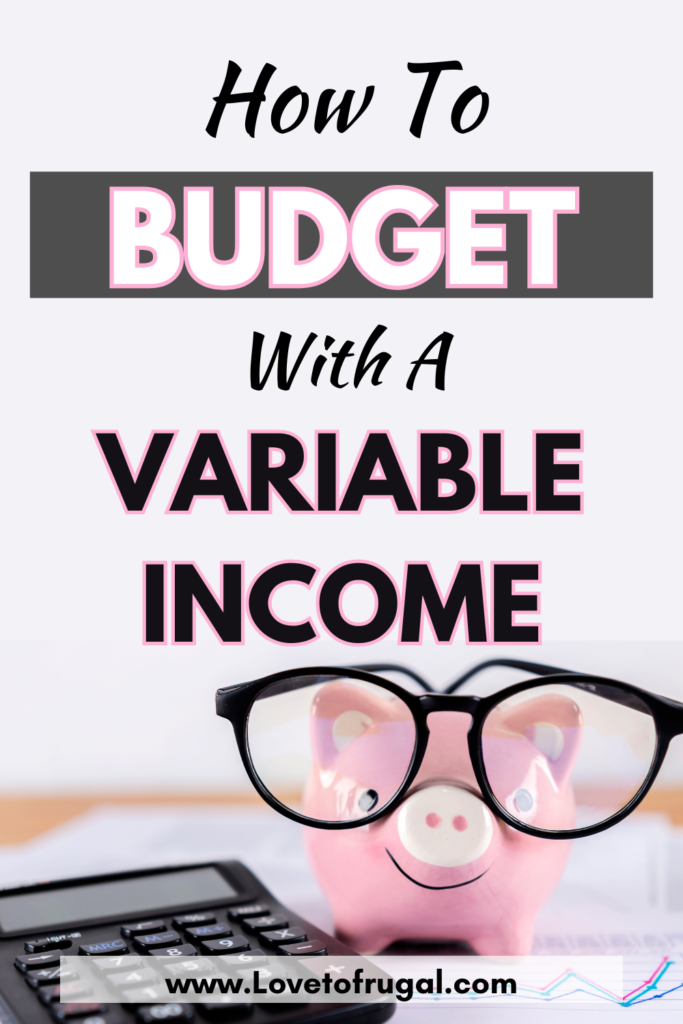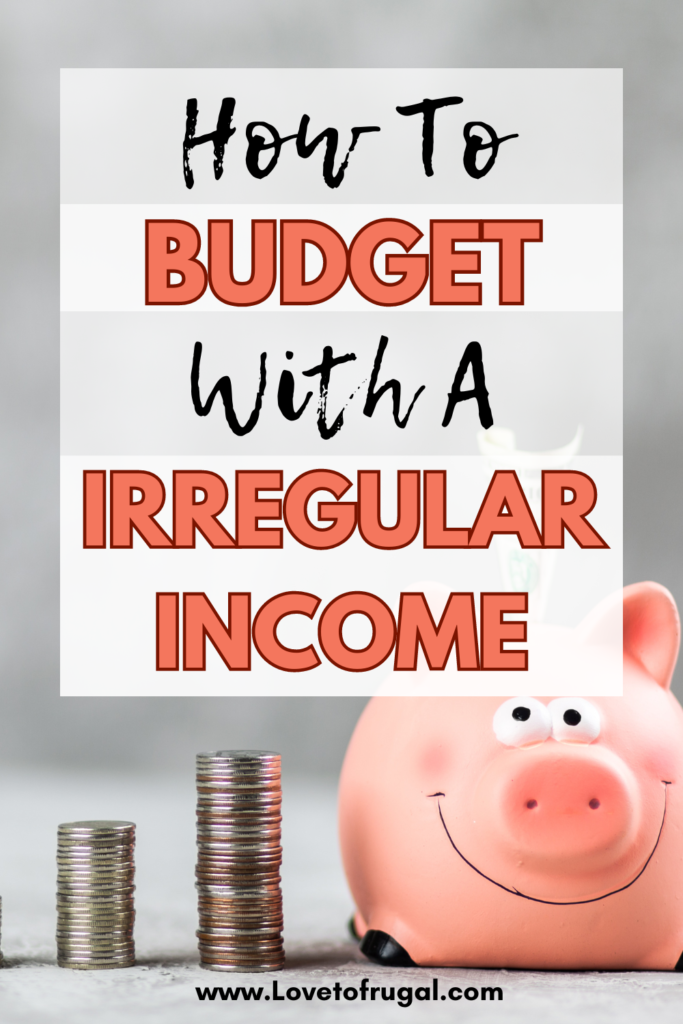Budgeting With A Variable Income-Valuable Money Tips To Know
Budgeting is a vital skill for managing your finances, but it becomes even more crucial when you have a variable income and it fluctuates month to month.
This has been the case with my income for years. Luckily, we never fully depend on it (too much). My husband’s income has always been pretty steady. Even now, his pension check is very consistent and that’s what we pay the majority of our bills with. On the other hand, my income has always fluctuated and while we do consider it when we budget, it’s not our main source. Blogging can be very inconsistent and I’ve learned over the years that my income is tied to the algorithms of Pinterest and Google (EXTREMELY unpredictable). Therefore, I have used this budgeting technique with an extremely variable income and it seems to work exceptionally well.
Whether you’re a freelancer, a contractor, a small business owner like myself, or working in an industry with seasonal shifts, living with variable income requires a unique approach to budgeting. The uncertainty of not knowing how much you’ll make from one month to the next can be vert stressful, leading many people to feel anxious and out of control. However, with the right strategies in place, you too can effectively manage your money, build financial security, and even thrive on an irregular income.
This post will walk you through proven steps (that I have used) to create a budget that accounts for the unpredictability, allowing you to stay on top of your finances and plan for the future—no matter how much your income may vary.
*This post may contain affiliate links, which means that if you buy a suggested product, I will earn a small commission, at no extra cost to you. For more information, see my disclosure page.

Calculate Your Minimum Monthly Expenses
Start by identifying your fixed and essential monthly expenses—those bills you must pay regardless of how much money you make. This includes:
- Rent or mortgage payments
- Utilities (electricity, water, internet)
- Groceries
- Transportation
- Insurance (health, car, etc.)
- Minimum debt payments
Your goal is to determine the absolute bare minimum you need to cover these expenses each month. This figure is your baseline (bare bones) budget—the amount you need to survive, even in lean months.
Track Your Income And Expenses For 3-6 Months
The key to budgeting on a variable income is to understand the fluctuations. Track your income and expenses for (ideally) at least three to six months. This will give you an accurate picture of your earning patterns. Then, use this data to identify:
- Average income
- Peak income months
- Lowest income months
This information helps you plan for both high and low-earning periods, ensuring that you’re prepared for anything.
Your bank statements can be a great starting point for this task, as well. Gather the last 3-6 months and go over each one to determine what your income and expenses have been.
Establish A Bare-Bones Budget For Lean Months
Once you know your minimum expenses, create a bare-bones budget that aligns with the lowest amount you typically earn. During lean months, stick strictly to this budget, prioritizing only essential expenses. If your income exceeds this minimum, you’ll have extra funds to save or allocate toward other goals.
Set Up A Three-Tier Budget System
A tiered budgeting system is a great way to stay flexible. Break your budget into three categories:
- Tier 1: Essential expenses (bare-bones budget)
- Tier 2: Non-essential but important expenses (e.g., dining out, entertainment)
- Tier 3: Discretionary spending (e.g., luxury purchases, vacations)
On low-income months, only cover Tier 1 expenses. In moderate months, you can add Tier 2. In high-income months, you can indulge in Tier 3. This system ensures your essential needs are met first, no matter how much you earn.
Build An Emergency Fund Specifically For Irregular Income
An emergency fund is crucial for anyone, but it’s even more critical if your income is unpredictable. Aim to save 3-6 months’ worth of living expenses, but don’t stop there. If your income tends to fluctuate significantly, consider increasing your savings to 9-12 months’ worth of expenses. This fund acts as a buffer during months when your income is lower than expected.
Pay Yourself A Salary
If your income is inconsistent, paying yourself a consistent “salary” can provide stability. Calculate an average monthly amount you can comfortably live on, then transfer this amount to your checking account each month, even if you earn more. Any income above this amount goes into savings, your emergency fund, or can be invested.
For instance, if your average monthly income is $4,000, but some months you earn $2,500 and others $5,500, aim to pay yourself $3,000 every month. On high-earning months, set aside the extra $2,500, and draw from it when your income dips.
Save, Save, Save During High-Income Months
When your income is high, resist the urge to splurge. Instead, put aside a significant portion into your emergency fund or savings account. Use this cushion to cover expenses during low-income months. Saving aggressively when times are good ensures you’re financially secure when income is lean.
Automate Savings And Bill Payments
Automation is a powerful tool when budgeting on a variable income. Set up automatic transfers to savings and bill payments for your essential expenses. This ensures your most important obligations are always met, even if your income varies. Automating savings also makes it so much easier to stick to your financial goals.
Consider A Side Hustle To Smooth Out Income Fluctuations
When worse comes to worst, a side hustle can be a game-changer when dealing with an irregular income. Choose a flexible gig that allows you to earn extra money during low-income months. Whether it’s freelance work, selling handmade goods (Etsy, craft shows, Facebook Marketplace, etc.), or driving for a ride-share service (Uber, Lyft), having additional income streams can help stabilize your finances.
Regularly Review And Adjust Your Budget
Budgeting on a variable income requires frequent adjustments. Set aside time each month to review your income, expenses, and savings. Analyze any changes and tweak your budget as necessary. As your income grows, you can gradually increase your savings goals and discretionary spending.
Plan For Taxes
If you’re self-employed or freelancing, setting aside money for taxes is essential. Estimate your tax liability and save a percentage of each paycheck in a separate account. This prevents any unpleasant surprises come tax season. It’s advisable to save between 25-30% of your income for taxes, but consult with a tax professional for more accurate advice based on your situation.
Focus On Long-Term Financial Goals
While budgeting for today is essential, don’t lose sight of your long-term goals. Whether it’s buying a home, retiring early, or building wealth, allocate a portion of your income toward these objectives. Even if it’s a small amount during lean months, consistently contributing toward your goals will pay off over time.
Develop A Mindset Of Flexibility And Patience
Finally, budgeting on a variable income requires a mindset shift. Be prepared to adjust your budget often, prioritize what matters most, and maintain patience during financial ups and downs. By staying committed to your plan, you’ll find yourself more resilient and better equipped to handle the unpredictability of a fluctuating income.
Final thoughts…
Managing a budget on a variable income might feel like trying to hit a moving target, but with a little patience and some smart planning, it doesn’t have to be a struggle. By taking the time to understand your essential expenses, setting up a plan for those unpredictable months, and saving whenever you can, you’ll be better prepared to handle whatever comes your way. Kind of like preparing for the worst and hoping for the best.
Remember, budgeting isn’t about being perfect—it’s about being prepared. With these steps, you’ll have the tools you need to stay in control of your finances, no matter how much your income may fluctuate. So, take a deep breath, give yourself some grace, and know that every step you take is a step toward a more secure and frugal future. You’ve got this, friend!
For more money-saving tips and strategies, subscribe to our newsletter at Love to Frugal! You can also follow me on Pinterest, Facebook & Instagram for even more money saving, frugal living tips!
OTHER POSTS YOU MAY BE INTERESTED IN:
Proven Strategies For Saving More Money On Monthly Bills
How To Do A Zero Based Budget-Why It’s The Best Method
How To Use The Half Payment Method

